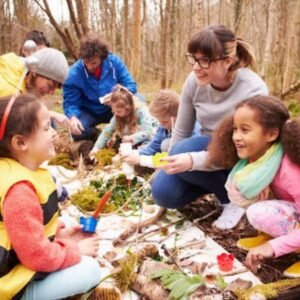Showing 1–12 of 51 results
-

£5.00A 2-year progress check is a key assessment for children at age two. It reviews a child’s development across various areas. The check focuses on communication, physical development, and social skills. Early years practitioners work closely with parents to complete the check. It helps identify any areas where a child may need additional support. The progress check ensures that children meet developmental milestones and provides a clear picture of their progress. This check also highlights strengths and areas for improvement. It supports early intervention and ensures children’s needs are met. The 2-year progress check aligns with the EYFS framework.
-

Active Learning Skills Level 2 supports early years practitioners in promoting learning through movement and physical exploration. The course covers essential activities such as mark making, balancing, climbing, clapping, singing, and dancing. It shows how active play helps children build resilience, focus, and readiness for learning. Practitioners gain clear guidance on encouraging participation and supporting critical thinking. This CPD-accredited course follows the EYFS framework and meets Ofsted standards. Learn online at your own pace with interactive content. Improve your professional skills and create engaging, active learning environments that support every child’s development and individual learning journey.
-

This Level 2 ADHD Awareness course gives you essential knowledge to recognise, understand, and support children with ADHD. You will explore common traits, triggers, and behaviours, along with practical strategies to improve focus, reduce anxiety, and encourage positive outcomes. The course helps you build confidence when working with children in early years and educational settings. You will complete engaging modules, interactive tasks, and a short assessment. Start today and gain the tools to make a real difference in the lives of children with ADHD.
-

£5.00Adult-led play involves structured activities where an adult guides the child’s learning and development. The adult provides resources, sets goals, and supports the child’s engagement. This approach encourages specific skills, such as problem-solving and social interaction. Adult-led play helps children develop focus and concentration while promoting essential learning outcomes. The adult may introduce new concepts and ideas, creating opportunities for growth. It complements child-led play, providing balance in early years education. Through adult-led play, children can gain new experiences that challenge their thinking and enhance their creativity. This method supports children’s development in a purposeful, guided way.
-

An Introduction to the Autism Spectrum Level 2 is designed to provide essential knowledge on autism. This course covers the key characteristics and behaviours associated with autism spectrum disorder (ASD). Learners will explore strategies to support individuals with autism in various environments. The course also focuses on understanding the sensory needs and communication challenges faced by those with ASD. By the end of this course, participants will have a deeper understanding of the autism spectrum and how to create inclusive environments for individuals with autism. Ideal for those working in education or care settings, this course helps improve support for people with autism.
-

An Introduction to the Forest School Approach Level 2 explores outdoor learning and how it supports child development and wellbeing. This course introduces the core principles of the Forest School approach used in early years settings. You will learn how nature-based learning builds confidence, resilience, independence and self-esteem in young children. The course explains how regular outdoor sessions help children manage risks and develop problem-solving skills. You will also explore how child-led play supports creativity, physical development and emotional growth. This training helps you understand your role in planning and leading safe, engaging outdoor sessions. You will learn how to assess risks and follow essential health and safety guidelines. The course highlights how Forest School supports the EYFS and complements indoor learning. It also shows how to include all children, including those with additional needs or SEND. An Introduction to the Forest School Approach Level 2 encourages a love of learning through hands-on experiences in nature.
-

£5.00Birth to 5 Matters” is a practical guide for early years education, supporting child development from birth to five years old. It focuses on promoting positive learning experiences through play-based activities. The framework outlines key areas of development, including communication, physical skills, and emotional well-being. It encourages a holistic approach, ensuring children’s individual needs are met. The guide is designed for early years practitioners to support effective teaching methods. It helps ensure that all children receive high-quality early education. “Birth to 5 Matters” aligns with the Early Years Foundation Stage (EYFS) and promotes inclusive learning for all children.
-

£5.00Birth to 5 Matters supports early years practitioners in implementing observations to track children’s development. Observations help identify each child’s progress in key areas, including communication, social skills, and physical development. Practitioners can plan tailored activities based on these observations, ensuring children’s individual needs are met. Regular, accurate observations contribute to a deeper understanding of a child’s learning journey. The framework encourages child-centred approaches, promoting active participation. By implementing observations, practitioners can create a responsive learning environment. This approach aligns with the Early Years Foundation Stage (EYFS) and helps ensure the best outcomes for children’s development.
-

This course is designed for senior practitioners and managers in early years settings. It covers brain development from conception to early childhood. You will learn how different brain areas influence development stages. The course also explores the impact of adverse childhood experiences (ACEs) on brain and child development. Understanding these concepts will enhance your practice and help you deliver a more effective EYFS curriculum. CPD accredited, this course aligns with Ofsted and UK regulations. It is ideal for professionals seeking to improve their knowledge of child development. This course does not offer a regulated qualification.
-

Breaking Barriers – Working With Children With SEND Level 2 supports early years staff working with children who have additional needs. This course helps you build the knowledge and skills needed to support children confidently and effectively. You will explore common challenges faced in early years settings when working with children with SEND. The course offers clear strategies to help you meet every child’s individual needs. You will also learn how to work closely with parents and professionals in your setting. This course explains the SENCO’s responsibilities and how to follow the correct procedures and documentation. It aligns with the EYFS framework and supports Ofsted requirements across all UK nations. The training includes guidance for England, Scotland, Wales, and Northern Ireland regulations. You will complete the course feeling more confident in your ability to support all children. Breaking Barriers – Working With Children With SEND Level 2 encourages inclusive practice and positive outcomes for every child.
-

£5.00Breast ironing is a harmful practice where girls’ breasts are pressed or pounded to stop growth. It is usually carried out by family members, often in an attempt to delay puberty. This practice is most common in parts of Africa but has been reported in other countries. Breast ironing can cause physical and emotional damage, including pain, infections, and long-term health issues. It also violates human rights and affects a girl’s well-being. Raising awareness about breast ironing is crucial to prevent it. Communities and organisations work to educate and protect girls from this harmful and illegal practice.
-

£5.00Changes to funding in 2024 aim to improve financial support for childcare providers and early years services. The new funding model focuses on increasing accessibility and supporting the sector’s growth. It provides additional resources to support children with special educational needs and disabilities (SEND). Funding will also be allocated to improve staff qualifications and professional development. These changes aim to reduce financial pressures on providers and ensure high-quality early years education for all children. Providers must familiarise themselves with the updated funding guidelines to ensure compliance and secure financial support. The new funding system promotes fairness and better outcomes for children.
End of content
End of content













